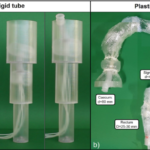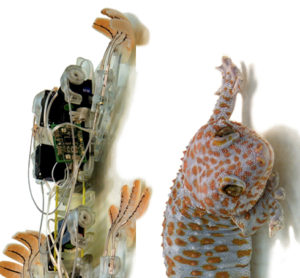A Soft Pneumatic Inchworm Double balloon (SPID) for colonoscopy
The design of a smart robot for colonoscopy is challenging because of the limited available space, slippery internal surfaces, and tortuous 3D shape of the human colon. Locomotion forces applied by an endoscopic robot may damage the colonic wall and/or cause pain and discomfort to patients. This study reports a Soft Pneumatic Inchworm Double balloon (SPID) mini-robot for colonoscopy consisting of two balloons connected by a 3 degrees of freedom soft pneumatic actuator. SPID has an external diameter of 18 mm, a total length of 60 mm, and weighs 10 g. The balloons provide anchorage into the colonic wall for a bio-inspired inchworm locomotion. The proposed design reduces the pressure applied to the colonic wall and consequently pain and discomfort during the procedure. The mini-robot has been tested in a deformable plastic colon phantom of similar shape and dimensions to the human anatomy, exhibiting efficient locomotion by its ability to deform and negotiate flexures and bends. The mini-robot is made of elastomer and constructed from 3D printed components, hence with low production costs essential for a disposable device.
Learn about our two Decals!
 Click here to find out more about our Fall Bioinspired Design Decal and our Spring Bioinspired Design in Action Decal – ALL MAJORS are welcome.
Click here to find out more about our Fall Bioinspired Design Decal and our Spring Bioinspired Design in Action Decal – ALL MAJORS are welcome.Berkeley BioDesign Community
 Click here to learn about the BioD: Bio-Inspired Design @ Berkeley student organization or here to signup for more info.
Click here to learn about the BioD: Bio-Inspired Design @ Berkeley student organization or here to signup for more info.Search
Student Login




I imagine that the neurological circuits underlying these processes are governed by both 2d spacing maps with their brains as…
to reduce the impact of car accidents, it may be possible to study the force diverting physics of cockroaches to…
you see this type of head-bobbing stability in many avian creatures related to pigeons like chickens. the head ability to…
not like they taught horses how to run! this is an example of convergent evolution where both sea creatures and…
The brain functions in a similar way with neuronal connections. our brains are able to utilize the multiplicity of connections…